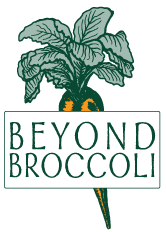Next week I begin a new series of Beyond Broccoli classes called Food & You: Exploring Beyond the “What.” I am excited about this unique option for nutrition education and support for the many people in our community who struggle with food, weight, and body image, using a behavioral nutrition approach that recognizes in many cases – “it’s not about the food.”
Not long after I started Beyond Broccoli back in 2001 I remember thinking that so much of my formal training and education in nutrition focused on what to eat (or not eat) for a variety of outcomes, and yet the most important work I did with individual clients came down to something we spent relatively little time studying: behavior change.
I remember learning about the “Stages of Change” model that describes the process most people go through to make changes. I was fascinated by this process, though I had no idea at the time this would be some of the most important information to my practice with individual clients. It didn’t take long for me to realize that struggles with food, weight and body image add layers of complexity to changing habits. If I want my clients to be successful in making sustainable changes, together we need to explore well beyond the “what” of their eating habits. So I have devoted much time and energy over the past dozen years to learning more about this whole process.
I suspect some find this idea of a nutritionist not focusing on the “what” confusing. Aren’t nutritionists supposed to be the experts on what to eat (or not eat)? Isn’t that why we consult with them?
As a Registered Dietitian it is important that I know about Medical Nutrition Therapy, or how nutrients can prevent or manage disease and illness. Here in Jackson it also helps me to know about sports nutrition to help my clients optimize food as fuel. Educating clients about the links between food and mood is important for both long-term health and how they feel on a daily basis, often a much more compelling reason to make changes. So yes, what we eat, and don’t eat, is definitely important and a major focus of my ongoing work (and continuing education requirements).
I am also passionate about the need for nutrition education to go beyond just spewing information. I enjoy helping clients acquire tools and build skills to actually apply this information in the context of their individual life situations – or more simply, the “how” related to eating habits.
However, I now know that actually making changes often goes way beyond needing to change, wanting to change, and knowing what to do. I can put together the best meal plan ever for someone, based on all the current research and my clinical experience, but if she isn’t engaged in the process of making the plan and it doesn’t fit into her lifestyle, isn’t compatible with her life goals and values, or doesn’t take into account where she is in the readiness for change process, this “ideal plan” is likely to fail. This leads me to the real crux of changing habits – the “why.”
As I see it, my area of expertise is food and nutrition while my clients and patients are the experts on themselves, even if they are not conscious of this fact. They know why they want to change, or think they want to change, and more importantly what they are willing to do. Sometimes it takes a bit of effort to uncover the layers of “why” and sometimes for clients who struggle with food, weight and body image (which is many of my clients) this process works better with the with additional guidance and support from a skilled therapist using a team approach.
This idea of enlisting additional support for the often challenging process of changing habits is why a group situation can be really helpful. The “Food & You” classes are a way to apply some of what I do with individual clients in a group setting. I offer nutrition education and support using this behavioral nutrition approach rather than dictating “eat this” or “don’t eat that.” Together we explore the myriad factors that influence what we eat, as well as how, when, where, and why. Each class includes a different relaxation or mindfulness technique to get things started, creative and interactive class activities to spur discussion, and a host of ideas, tools and a chance to practice building skills that can help participants move forward in their journey toward a better relationship with food.


